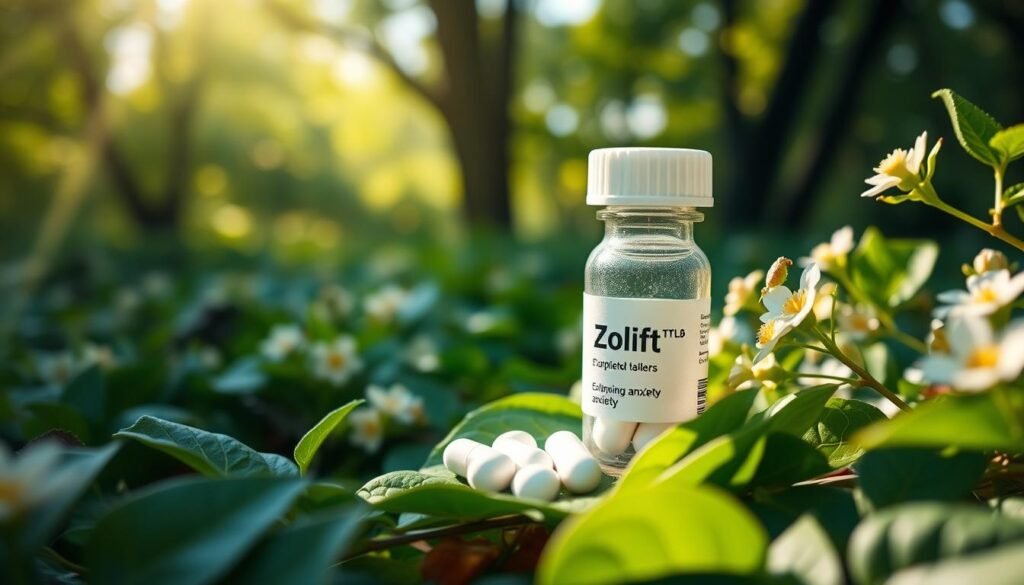About 31.1% of U.S. adults will face an anxiety disorder in their lifetime. It’s key to know how effective medications like Zoloft can be. Zoloft, or sertraline, is often used for anxiety disorders such as Generalized Anxiety Disorder and Panic Disorder. This article checks if 25mg of Zoloft is enough to ease anxiety. We’ll look at dosing advice, how well it works, possible side effects, and how to handle anxiety with Zoloft.
Key Takeaways
- Zoloft is commonly prescribed to treat various anxiety disorders.
- The typical starting dosage for anxiety-related conditions is 25mg daily.
- Effectiveness of 25mg Zoloft can vary between individuals.
- Dosage adjustments typically occur based on patient response.
- Common side effects may include nausea and drowsiness.
- Long-term management and monitoring are crucial when using Zoloft.
Understanding Zoloft and Its Uses
Zoloft, also called sertraline, helps manage anxiety as a selective serotonin reuptake inhibitor (SSRI). By changing serotonin levels in the brain, it helps control mood and emotional well-being.
Beyond treating anxiety, Zoloft is FDA-approved for depression, OCD, and PTSD. It’s chosen often because it helps with social anxiety and panic disorders.
Studies show Zoloft’s success in treating Generalized Anxiety Disorder (GAD). Patients felt less worry and restlessness. Over half saw improvements with Zoloft versus a placebo.
The starting dose for adults is usually 25mg. This amount has helped reduce anxiety symptoms like better focus and less restlessness.
Zoloft works for kids and teenagers too but starts at lower doses. Checking in with doctors regularly is key to adjusting the treatment as needed.
In short, Zoloft is widely used in mental health care. Its diverse applications and successful outcomes make it a top choice amongst healthcare providers.
How Zoloft Works for Anxiety Treatment
Zoloft, also known as sertraline, is key in treating anxiety. It mainly works by inhibiting serotonin reuptake. This lets more serotonin stay in the synaptic cleft. Serotonin is a brain chemical that helps control mood.
By keeping serotonin around longer, Zoloft boosts its ability to calm the nervous system. This is a big help for those dealing with anxiety.
Clinical studies back up the zoloft mechanism for anxiety. They show a big drop in anxiety symptoms for those on Zoloft. This includes feeling less worried, nervous, and restless compared to those taking a placebo. Many noticed a big improvement in how they felt every day.
Zoloft is also good for panic disorders. People in studies had fewer and less severe panic attacks.
Anxiety disorders are quite common, impacting around 31.1% of adults in the US at some point. Knowing how Zoloft helps is important. Those who use it often start feeling better within weeks. It offers hope and helps with managing emotions better, leading to a better life.
Zoloft Dosage Guidelines for Anxiety Disorders
Zoloft is often given to those with anxiety, starting at 25mg. Adjustments are made based on the patient’s response. This starting dose helps manage anxiety well.
Panic Disorder and PTSD start at 25mg too. If there’s no improvement, the dose may increase by 25mg to 50mg weekly. Up to 200mg may be prescribed based on health and progress.
For clarity, the following table outlines the zoloft dosage guidelines for different anxiety diagnoses:
| Condition | Initial Dose | Maximum Dose |
|---|---|---|
| Panic Disorder | 25mg/day | 200mg/day |
| PTSD | 25mg/day | 200mg/day |
| Social Anxiety Disorder | 25mg/day | 200mg/day |
| Obsessive-Compulsive Disorder | 50mg/day | 200mg/day |
Starting with 25mg Zoloft for anxiety can lead to major improvements. It often takes 2-6 weeks to see changes. Patients may feel better in terms of sleep, energy, or appetite in the first two weeks.
Is 25mg of Zoloft Enough for Anxiety?
Finding out if 25mg of Zoloft is right for anxiety means looking at the recommended start doses and how people react to the drug. While experts say 25mg might work at the beginning for some, especially with mild anxiety, how well it works can differ a lot from person to person.
Initial Dosage Recommendations
What you start with on Zoloft depends on the kind of anxiety you’re dealing with. For conditions like panic disorder, 25mg is often where to start. But, for other disorders, doctors might suggest starting at 50mg a day. That shows how treatment needs to be tailored to the individual. Doctors usually check how the patient is doing in the first few weeks. It might take 2 to 6 weeks to fully feel Zoloft’s effects.
Adjusting the Dose Based on Response
It’s key to watch how each person responds to their dose. If 25mg of Zoloft isn’t cutting it for anxiety relief, healthcare providers might up the dose. Having regular check-ups helps keep track of how things are going and make any needed changes to the dose. This way, people can get the best relief from anxiety with the least side effects.

Effectiveness of 25mg Zoloft for Anxiety Relief
Studies show that 25mg Zoloft effectively eases anxiety. It works well for many and has few side effects initially. People with anxiety disorders see positive changes with this dose.
Studies on Zoloft and Anxiety Symptoms
Research on Zoloft proves it helps those with Generalized Anxiety Disorder (GAD). They notice fewer anxiety symptoms after starting on 25mg. Clinical trials show a 50% symptom reduction compared to a placebo. The findings highlight:
- Less muscle tension and better sleep.
- Boosted concentration and relaxation.
- Fewer panic attacks in those with panic disorders.
Personal Experiences with 25mg Dosage
People share varied experiences with 25mg Zoloft for anxiety. For some, it’s greatly effective; others need dose adjustments. Users often report:
- Better mood and more calmness.
- Low side effects, which tend to lessen over time.
- Different reactions lead doctors to tailor doses individually.
Factors Influencing Zoloft Dosage for Anxiety
Many things affect the right dose of Zoloft for each person. The dose depends on medical history, age, and weight. It’s important to know these factors. They help decide the best way to treat anxiety.
Individual Health and Medical History
Your health history is key to finding the right Zoloft dose. If you have other health issues, your dose might need to change. This helps the medicine work well while keeping you safe. For example, if you have liver or kidney problems, you might need a lower dose. Doctors look at your health history to make sure your treatment matches your needs.
Age and Weight Considerations
How old you are and how much you weigh matter too. Older people and kids don’t process medicine the same way. Older adults might need half the regular dose. Kids start with a small dose, which can change based on how they react. Doctors think about your age and weight to give you the best treatment.

| Factor | Recommendation |
|---|---|
| Medical History | Adjust dosage based on pre-existing conditions |
| Age | Lower doses for older adults, starting at 25 mg for children |
| Weight | Adjust dose based on body mass |
| Liver/Kidney Function | Potentially reduce dosage to mitigate risks |
Common Side Effects of 25mg Zoloft
Using 25mg Zoloft can lead to several side effects. It’s vital for users or those thinking about using this medication to understand these effects. Knowing about the common side effects of Zoloft and their development helps in health management.
Short-term and Long-term Effects
The body’s first reaction to Zoloft can include short-term effects like:
- Nausea
- Dizziness
- Insomnia
These usually get better as your body gets used to the medicine. Long-term use might result in:
- Weight changes
- Sexual dysfunction
- Increased anxiety if stopped suddenly
If you experience severe or uncommon symptoms, talk to a healthcare provider. Knowing these effects can help avoid risks from long-term use.
When to Consult a Doctor
Seeing a doctor regularly is wise, especially if symptoms don’t go away. Get help if you notice:
- Signs of Serotonin Syndrome, like agitation or hallucinations
- Big mood shifts, including feelings of aggression or thoughts of self-harm
- Sudden severe dizziness or hormonal issues
Staying in touch with doctors is key. It helps manage both short-term effects and long-term effects of Zoloft well.
| Effect Type | Examples |
|---|---|
| Short-term Effects | Nausea, Dizziness, Insomnia |
| Long-term Effects | Weight Changes, Sexual Dysfunction |
| When to Consult | Severe Symptoms, Mood Changes, Functionality Issues |
How to Manage Anxiety with 25mg Zoloft
To handle anxiety using 25mg Zoloft effectively, blend medication with other treatments and life adjustments. By mixing these strategies, you can boost Zoloft’s impact and achieve greater mental wellness.
Complementary Therapies and Lifestyle Changes
Merging Zoloft with therapies like cognitive-behavioral therapy (CBT) helps greatly in tackling anxiety. CBT enables people to find and change negative thinking into healthier actions. Lifestyle changes are also key for mental well-being.
Adopting habits such as:
- Regular physical exercise
- A balanced diet rich in nutrients
- Mindfulness practices, such as meditation or yoga
These practices foster good health and boost Zoloft’s success in managing anxiety.
Importance of Consistency in Medication
Sticking to a steady medication schedule is crucial with Zoloft. Regular use keeps serotonin levels even, aiding symptom management. Skipping doses could lessen Zoloft’s efficiency and worsen anxiety.
It’s critical to stay in touch with doctors to tweak treatment as needed. This ensures the most effective anxiety control.

Long-term Expectations of Using Zoloft
Zoloft helps those with anxiety disorders over the long term. Users often feel better, but results can change. Doctors regularly check in to tweak treatment as needed.
About 31% of adults will deal with anxiety in their life. Worldwide, 264 million adults are impacted. Managing Zoloft’s effects over time is key due to lifestyle and body changes.
Using Zoloft means having check-ups every four to eight weeks. These help adjust the dose. Improvements in sleep and energy can start in 1-2 weeks. But, bigger changes may take up to 12 weeks.
Some users face side effects which differ between men and women. This includes sexual dysfunction, possibly affecting treatment commitment. Combining therapy and lifestyle changes is important for lasting mental health.
| Expectation | Timeframe | Details |
|---|---|---|
| Initial Improvements | 1-2 weeks | Changes in sleep, energy, or appetite may occur. |
| Substantial Changes | 6-12 weeks | Reduction in depressive symptoms is expected. |
| Follow-up Appointments | Every 4-8 weeks | Assessment of medication efficacy and side effects. |
Long-term Zoloft use is a team effort between patients and doctors. Open talks are essential. This lets people better manage their mental health.
Conclusion
The issue of whether 25mg of Zoloft is enough for anxiety is not simple. It has been effective for many, especially for those with Generalized Anxiety Disorder (GAD). Still, how it works can differ a lot from one person to another. It’s crucial to keep in touch with doctors and regularly check in. They give personalized advice that matches your unique case.
Healthcare providers stress the importance of a thorough evaluation before setting a Zoloft dose for anxiety. Factors like age, health status, and how severe symptoms are matter a lot. Often, patients need to adjust their dosage after starting treatment. This helps find what works best. So, talking with your doctor is key to tailoring your treatment to your needs.
While starting with 25mg of Zoloft might be right for some, the path to feeling better usually requires a specific plan. The goal is to slowly get better while working closely with healthcare professionals. It’s about finding the best approach together for effective results.